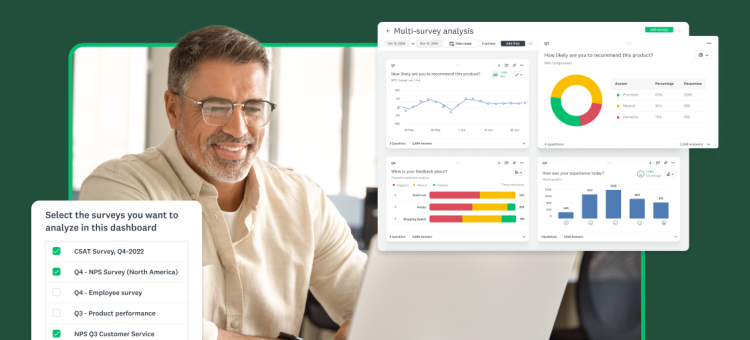2024 is noteworthy for many reasons—it’s an election year, an Olympics year, a leap year; and for marketers, a year of change. This is the year when marketers will have to navigate a contradictory set of trends and conflicting priorities.
Start with AI—legislation for regulation is in full swing at the same time that most marketers report they have adopted AI for daily use. Third-party cookies and consumer privacy laws are being upended, just as companies prioritize more personalized and relevant connections with customers. Layoffs continue in key industries, like tech, while the need for digital marketers, social media managers, content creators, and digital designers top the list of in-demand skills.
None of this is bad news—these changes will actually lead to more opportunities for marketers. But change can also be disruptive, and from what we know, marketers like to be prepared.
We asked 707 workers in the US, including 507 marketing professionals and 200 market researchers, what they thought of the state of marketing—and how these changes might reshape their jobs. Here are the most important trends in marketing for 2024, plus three strategies marketers identified to keep up with changing times.
1. Get personal with your marketing programs
Creating more personalized interactions is a big priority this year, and organizations are looking to marketing to deliver. In our study, improving connections with customers is front and center, with personalization topping the list of company goals.
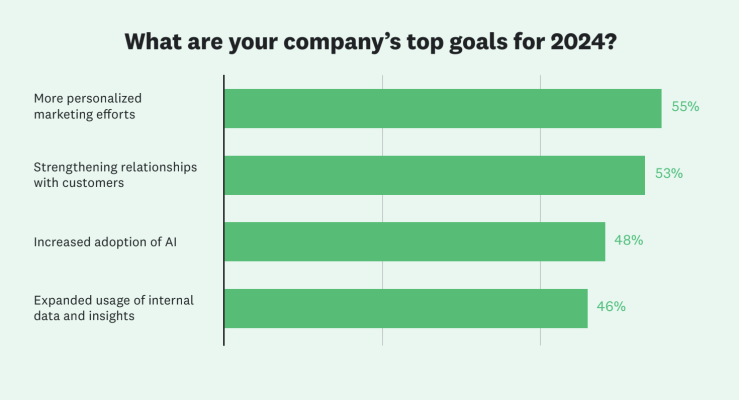
This might be a hard nut to crack for many marketers. While personalization has been a challenge in the past, it will be even more difficult with the elimination of third-party cookies. For decades, marketers have relied on cookies to customize their interactions based on a user’s activities across the web.
Add to this that over 40% of marketers said their marketing efforts were only somewhat or not at all personalized, and marketers will need to come up with a new formula to tap into customer preferences.
Marketers need to focus their efforts on finding new ways to connect with users to understand their interests and needs. They will need to collect first-party data instead of relying on third-party data collected on other websites.
All of this will lead to an increased focus on marketing fundamentals—targeting your audience, segmenting users to understand their unique preferences, and encouraging connections with more personalized engagement.
2. Up your performance game with multichannel marketing
Marketing has become more performance based for years, but this is the year to show your value. Companies have increased performance expectations and marketers are feeling the heat.
86% of marketers expect their team’s performance expectations to increase in 2024, up 7 points from 2023
One of the most important marketing trends that will rely on data is the shift to multichannel marketing. Multichannel marketing is not a new idea, but today's version is designed for a digital world, with the goal of collecting data on customers from a wide variety of sources.
Over half (55%) of marketers say they currently reach customers through multiple channels. That percentage is likely to go up as marketers recognize that every channel presents an opportunity to collect first-party data, which is key to more personalized engagement and customer experiences.
Four out of ten marketers (42%) say they will rely on first-party data to understand customers, and the ways they will collect this data are varied. Sign-up forms, email, sales outreach, direct mail—gated content is making a comeback. Almost half (49%) of marketers will require customer information before providing access to certain content, and another, 43% say they rely on individual or personal outreach to customers.
This need for data isn’t new—understanding customers has always been part of successful marketing programs. But how data is used is and how it is collected and applied to problems will change. And much of that is because of new technologies that are fueling some fundamental breakthroughs in how marketing gets done.
3. See new technologies as tools not threats
Yes, we’re talking about AI. With all the headlines and hype, we weren’t sure where marketers would land with their thoughts about AI. Would it play into fears of job elimination and replacing humans with bots? Would it rock the foundation of how marketers connect with customers by undercutting established SEO, social, and paid marketing activities?
We knew that marketers would have big opinions on the subject, and we were not wrong. In our study, over two-thirds of marketers are excited about AI and the impact it will have on their job—and are very aware of all the ways it can be of value.
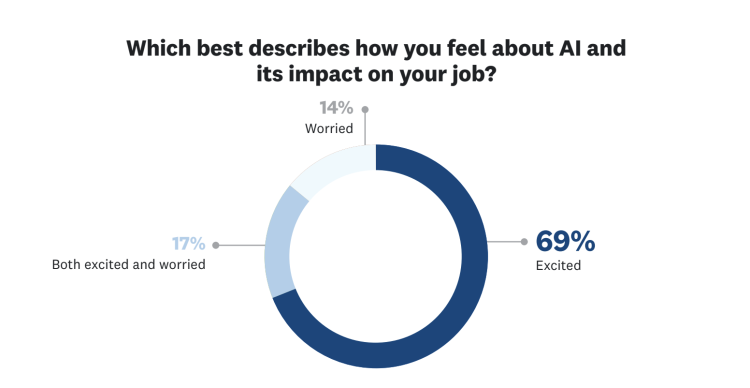
We were surprised to find that almost nine in ten marketers are current users of AI and rely on it in their job. They report it has accelerated their ability to make decisions, generate content, and uncover insights in all aspects of their work.
88% of marketers say they rely on AI in their current job
This is not just kicking the tires—marketers report they are using AI for mainstream activities; from generating content, like blog posts, slides, or social media, to optimizing SEO and email campaigns.
The impact of AI is hard to miss; it appears to accelerate and improve some of the most important aspects of marketers’ jobs.
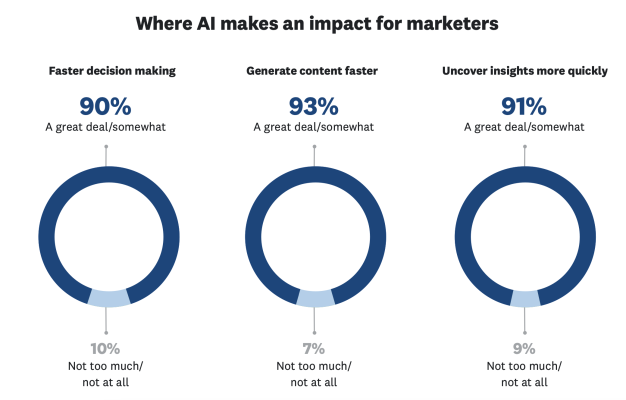
The elimination of cookies will also have an impact on how marketers operate. Once again, however, marketers seem prepared to move forward.
While 87% marketers express some level of concern over the elimination of third-party cookies when it comes to understanding customers, they have already put alternatives in place. Almost half of companies already are using alternatives and another 41% are evaluating new approaches.
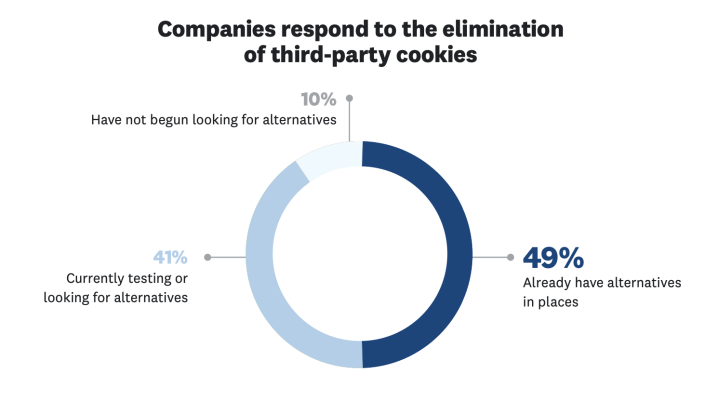
More importantly, there are upsides to eliminating cookies. Two out of three marketers (66%) say the increased scrutiny on customer privacy can be used as a marketing advantage.
There’s a lot more to learn about how marketers are adapting to this new era of predictive, personalized, and high-performance marketing. Get the report, and uncover more insights about what’s next for marketers.
Marketing trends for a new era
Get insights into how marketers will address more competition, next-generation technologies, and new ways of getting work done.



